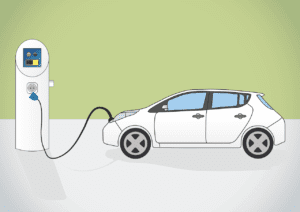Introduction
As we look toward a more sustainable future, electric vehicles (EVs) are becoming a central part of that vision. They’re being touted not only as eco-friendly alternatives but also as smart financial investments for individual consumers. With advancements in EV technology and a growing charging infrastructure, the economic benefits of going electric are becoming more evident.
So, are electric vehicles the right financial choice for you? Let’s explore the potential cost savings, incentives, maintenance advantages, and financial planning aspects of owning an EV in today’s world.
- Initial Costs

One of the main concerns for potential EV buyers is the initial cost of purchase. EVs have historically had higher sticker prices than their gasoline-powered counterparts, but that’s changing as technology advances and manufacturing scales up. Today, a wide range of models is available at more accessible price points, and as battery prices drop, EVs are expected to become even more affordable.
While EVs may have higher upfront costs, they often come with significant long-term savings. Here’s a breakdown of what influences these costs:
- Battery Costs: Battery production was once a primary reason for high EV costs, but battery prices have dropped by over 85% in the last decade.
- Available Models: From compact sedans to SUVs, there’s now a diverse range of EVs, many with lower starting prices.
- Financing and Leasing Options: Many automakers offer competitive financing and leasing packages for EVs to reduce upfront costs. However, it’s important to remember that this option remains out of reach for most people due to income limitations and financial affordability constraints.
- Fuel Savings

When it comes to fuel savings, EVs have a clear advantage over gasoline-powered cars. For example, charging an EV at home generally costs significantly less than filling up a gas tank. The cost difference is particularly notable as gas prices fluctuate.
- Gas-Powered Car: Depending on the vehicle, a full tank of gas can range from $50 to $80, and this can add up quickly, especially if you have a long commute.
- Electric Vehicle: Charging an EV at home might only add around $30–$50 to your monthly electricity bill, depending on the local rates and the model of the car.
- Incentives and Tax Credits

One of the financial perks of buying an EV is the array of incentives, rebates, and tax credits available. Both federal and state governments in many countries offer these benefits to encourage adoption of clean energy vehicles. In the United States, for example, there’s a federal tax credit of up to $7,500 for new EVs, and additional incentives vary by state.
- Federal Tax Credits: In the U.S., buyers can receive up to $7,500 off their federal taxes depending on the car’s battery capacity and the manufacturer.
- State and Local Incentives: Many states provide additional rebates or credits. California, for example, offers a rebate of up to $2,000 for qualifying EVs.
- Utility Company Rebates: Some utility companies offer discounts on home EV chargers or reduced rates for home charging during off-peak hours.
- Maintenance and Repair Costs

One of the lesser-known financial benefits of EVs is the reduction in maintenance and repair costs. EVs have fewer moving parts than traditional internal combustion engines (ICE), which means less wear and tear and fewer parts to replace. Here’s how EVs stack up in terms of maintenance savings:
- Oil Changes and Spark Plugs: EVs don’t require oil changes, therefore this money is clearly saved.
- Brake Wear: Thanks to regenerative braking, EVs tend to experience less brake wear, extending the life of brake pads and rotors.
- Transmission: EVs typically have simpler drivetrains, eliminating common issues associated with traditional transmissions.
While there are still maintenance needs, such as tire rotations and battery health checks, EVs are generally cheaper to maintain. Over time, the reduced maintenance costs can make a significant impact on your budget.
- Resale Value

Resale value is another critical factor to consider when assessing the financial impact of an EV. Although EV resale values have been historically lower than ICE vehicles, this is rapidly changing. With increasing demand for used EVs and extended battery warranties, used EVs are becoming more attractive on the resale market.
- Battery Warranties: Many EV manufacturers offer battery warranties lasting up to 8 years or 100,000 miles, ensuring some peace of mind for second-hand buyers.
- Demand for Used EVs: As EV technology becomes more mainstream, demand for affordable used EVs has increased, stabilizing resale values.
Understanding resale value is crucial because it helps assess the total cost of ownership over time. If you plan to keep your vehicle long-term, resale value may matter less. However, if you anticipate upgrading within a few years, it’s wise to consider which models have the best resale performance.
- Charging Infrastructure

Access to charging infrastructure is an essential aspect of owning an EV, and it can influence the total cost of ownership. While public charging stations are becoming more widespread, home charging is often the most convenient and affordable option for many EV owners.
- Home Charging: Installing a home charger typically costs between $500 and $1,500, depending on your location and electrical setup. However, charging at home is almost always more economical than using public charging stations.
- Public Charging: Some charging networks offer free charging, but fast chargers can be pricey. Subscription-based charging plans may be worthwhile for those who frequently use public stations.
- Insurance Costs

Insurance costs for EVs are generally comparable to those for traditional vehicles, though they may be slightly higher due to the expense of certain EV-specific parts. Some insurers offer discounts for EV owners or policies tailored to account for fewer miles driven annually, which can help offset costs.
- Model and Cost of Parts: High-end EV models with expensive battery systems may incur higher premiums.
- Driving Patterns: If you’re using an EV as a secondary vehicle or primarily for commuting, you may qualify for mileage-based discounts.
Comparing quotes from insurance providers who understand EVs is wise, as some insurers may offer lower premiums based on driving habits and vehicle type.
- Depreciation and Battery Replacement
Battery health is a significant factor in an EV’s longevity and resale value. While most EV batteries are designed to last 8-15 years, it’s essential to plan for eventual depreciation and the possibility of a battery replacement.
- Battery Longevity: EV batteries are designed to maintain most of their capacity even after 100,000 miles.
- Replacement Cost: A replacement battery can be costly, typically ranging from $5,000 to $15,000, depending on the vehicle model. Many EVs, however, are reaching 150,000 miles without requiring a replacement.
This is an important consideration, especially if you’re buying a used EV. Some manufacturers now offer certified pre-owned programs with extended battery warranties, which can be beneficial.
- Environmental and Financial Impact

While the financial benefits of EV ownership are clear, there’s also a more extensive environmental and economic perspective to consider. Reducing carbon emissions, lowering dependence on fossil fuels, and supporting green industries can contribute to a healthier planet and a more sustainable economy.
EVs are expected to reduce the financial costs associated with climate change, such as disaster recovery and healthcare. By contributing to a cleaner environment, EV owners are making a long-term investment in a more resilient economy.
Conclusion
When considering an EV, it’s essential to balance the upfront costs with long-term savings, factoring in incentives, reduced maintenance, and fuel savings. Owning an EV may offer substantial financial benefits, especially as the technology matures and costs continue to fall. As more people shift toward electric mobility, EV ownership becomes not only a sustainable choice but also a practical, cost-effective one for securing your financial future. The six biggets electric car producers are Tesla, Xiaomi, Li Auto, Rivian, Lucid Motors and NIO.
